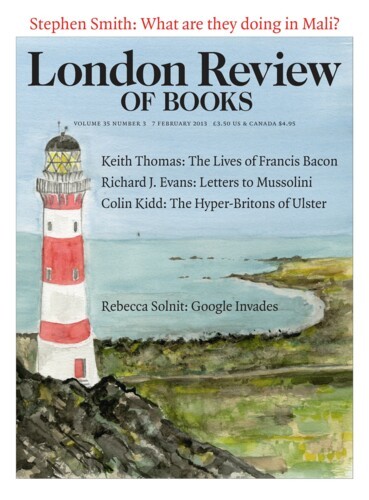The God Who Disappears
after Nonnus
Born to a life of dying, the boy-god’s first death came
when he could barely crawl, the budding horns just there,
nudged among curls, as he played on the floor
with his toys: a knuckle-bone, ball and spinning top,
golden apples, a tuft of wool, and
on his other side, the thunderbolts of Zeus.
They entered the throne-room’s dark,
their round faces smeared with chalk into pale moons,
and they slid forward, drawing their hungry knives.
He saw them in the mirror, looming behind him
in a hundred reflections,
and he watched his body swim through other shapes:
a doubled-up ancient with a face of rain,
a blank-eyed baby, downy youth. Then he saw the mane
of a lion, jaws opening, the sinewed neck
of a bridling horse, the darting tongue
and poison fangs and coils stretching
for the throat of one of the murderers, then
twisting, to the leap of a tiger, the shouldering,
heavy-horned bull, and then suddenly the great bull
shuddered to a stop,
and they started slicing him
to piecemeal; so many blades
he could see in the mirror,
working on the bull-shaped Dionysus.
He followed his image into the glass, and was soon
split and scattered, divided up, diced
into the universe.
*
He spends his life dying. The god who comes,
the god who disappears. Dismembered,
he is resurrected. He is beside us; beside himself.
Ghost of abandon, and abandoning,
he shatters us to make us whole.
Crimond
i.m. Jessie Seymour Irvine
Daughter of the manse of Dunnottar, then Peterhead
and Crimond, all north-eastern edges over unstill waters,
what softness brought this tune from your young hands?
The tune my father called for every Sunday: the 23rd Psalm.
When I hear it now, it’s all wet cobbles and the haar
rolling in down the street outside, and him
shaking their hands, sharp in his black and white:
the dog-collar (I knew) cut clean from a bottle of Fairy Liquid.
How far we all are from where we thought we’d be:
those parishioners all vanished long ago; my father – ash
above some crematorium; me, swimming back-crawl
through the valley of the shadow of death, and you –
not even a photograph left of you – the girl who will never
touch again the foot of the cross at Crimond.
Send Letters To:
The Editor
London Review of Books,
28 Little Russell Street
London, WC1A 2HN
letters@lrb.co.uk
Please include name, address, and a telephone number.

